|

by William Giovinazzo
March 25,
2020
from
ClassicalWisdom Website
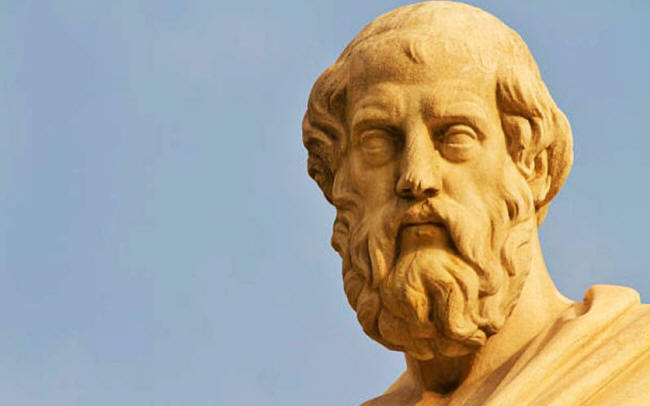
When I was a kid, I was
taught by the good sisters of Saint Joseph that democracy is a
'wonderful' thing, something ordained by God.
In the United States
in the early 1960s, it was seen as God's gift to man, the
bulwark against godless communism.
Kennedy was
telling us that we needed to spread democracy throughout the world
as a radical idea that would free humanity from the shackles of
oppression.
We all stood proudly
before the American flag,
chest out, arms
akimbo, defenders of truth, justice, and the American way which
was decidedly democratic...
That is what we were
taught.
As with many things the
good sisters told me,
reality is a bit more complicated...
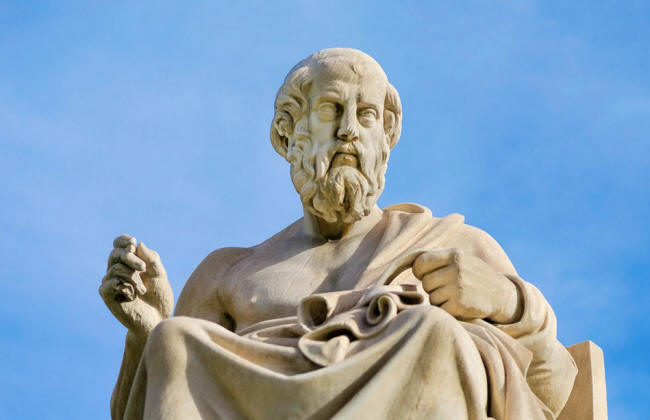
Marble statue of the ancient
Greek
Philosopher Plato.
Academy
of Athens,Greece.
In book 6 of Plato's
Republic, Socrates discusses
democracy with Adeimantus.
To describe the
shortcomings of democracy, Socrates uses the analogy of,
a ship whose crew
mutinies against their captain.
Although they have no
understanding of navigation or how to pilot a ship, they take
command.
When someone
disagrees with the ideas held by the crew, even those ideas
based on actual knowledge, the dissenter is jettisoned.
Decisions would be
made by the consent of the crew, all equal, regardless of
knowledge.
Is this the type
of ship you would choose if you were planning to undertake a
long journey?
Wouldn't you
rather have someone at the helm who is trained in piloting a
ship?
In plotting the
course, wouldn't you prefer to have someone who understands
navigation?
Yet,
a ship run by the
votes of the equal and unequal alike is how the democratic ship of
state is piloted.
Plato understood that such a ship is ripe fruit for a demagogue.
To demonstrate this
point, Socrates imagined an election between a doctor and a candy
store owner.
The doctor would tell
the populace what they didn't want to hear...
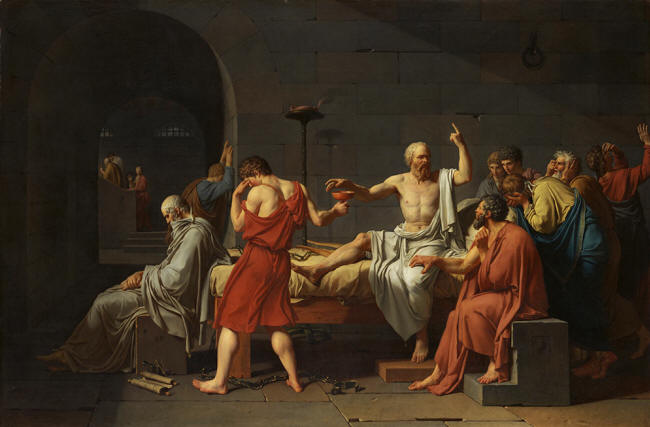
The Death of Socrates,
Jacques-Louis David, 1787.
Metropolitan Museum of Art, New York.
As Socrates described it,
the candy store owner
would say of the physician that he works many evils on you.
He hurts you, gives
you bitter potions, tells you not to eat and drink whatever you
like.
What fun is that?
The candy store
owner, however, would offer sweets and tasty things.
He would appeal to
what people wanted, not what they needed.
He would provide easy
and popular answers to all their difficult problems.
Democratic leaders who
value their position over what is right, or even what is good for
the country, have learned to be candy store owners.
They pander to whoever
will help them maintain power.
The result is a
vision not of the long-term future, but the next election....
Just consider one of the
many issues in today's headlines.
Do you raise taxes or
reduce spending? Neither! Simply raise the debt. Better yet,
increase spending and reduce taxes. So sweet. So tasty...
By the time the
repercussions of the decision become clear, if you are lucky,
you will be dead.
It will be someone else's
problem...
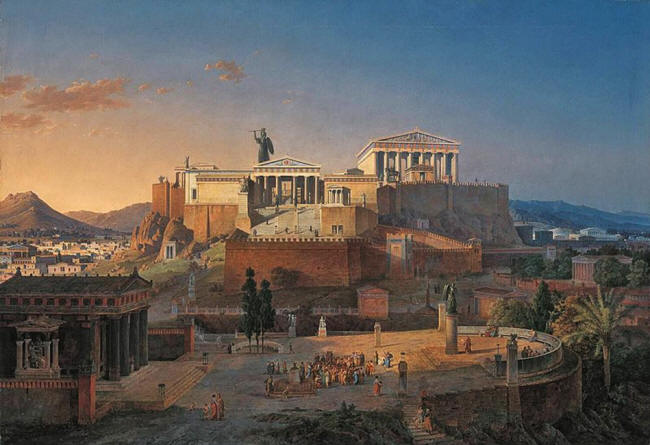
The Acropolis at Athens,
Leo von
Klenze (1846).
Democratic leaders are relatively free to do what they like, as long
as it is popular.
The masses have little
tolerance for complex reasoning and the minutia of various policies.
The clever demagogue will appeal to emotion, more concerned with
imagery than substance.
In democracies, political debates become superficial.
The focus is on how
the candidate is perceived.
Do they seem
presidential?
Are they strong and
decisive?
Do they tell it like
it is?
President
Bush seemed like the type of
person with whom people would like to have a beer.
This was seen as some
measure of his likability, an attribute, in the minds of
the masses, more critical than competence or knowledge.
Of course, Plato wrote
the Republic before the modern era and mass communication.
Technological advancement
only amplified the importance of a politician's public persona.
In 1962 Daniel J.
Boorstin published
The Image: A Guide to Pseudo-Events in America,
in which he describes how television and radio have created
pseudo-events, events that are staged with the intent to be reported
or reproduced and have an ambiguous relationship with the reality of
the situation.
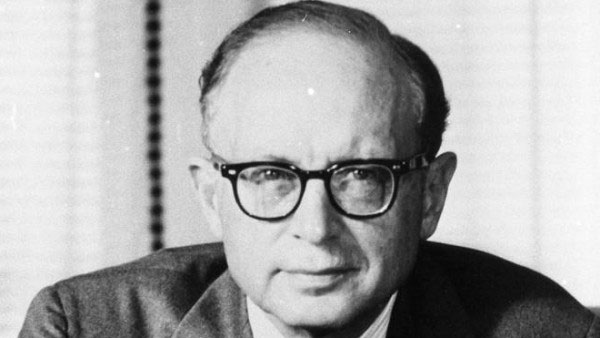
Photo of
Daniel
J. Boorstin
The intent is to shape public opinion.
As Boorstin said:
"Some are born great,
some achieve greatness, and some hire public relations
officers."
These pseudo-events, such
as the presidential debates, reduce,
"great national
issues to trivial dimensions."
Boorstin likened the
debates to the quiz show The $64,000 Question.
If you answer the
questions correctly your prize is the presidency. Of course, the
correct answer here is defined as the most popular answer.
Boorstin was just one
milestone between Plato and ourselves.
Since the historian's
time, we have become subjected to the 24-hour news cycle where news
networks compete for a larger share of the viewing audience.
It was also well before the ubiquity of the internet and social
media. We live in an age of celebrity, where people are human
pseudo-events, as Boorstin describes them. They are known for their
well-knowness.
It is the time of
influencers, people who can affect the purchasing decisions of
others not necessarily based on their expertise, but the size of
their audience. It is a society of superficiality and little
substance.
Plato's predictions have
come through with a vengeance...
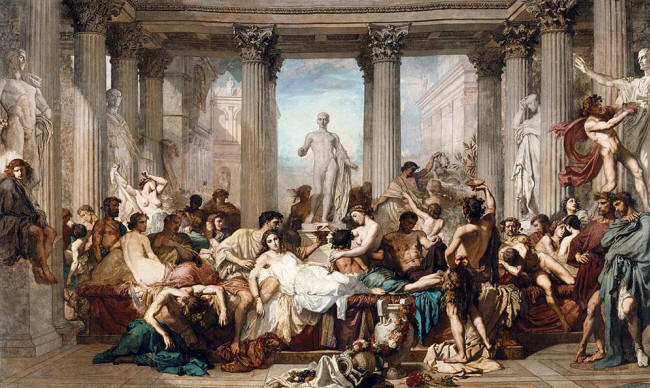
Thomas Coutre,
The
Romans in Their Decadence,
(Museo
de Orsay, 1847)
There is an even deeper challenge posed by democratic societies.
The ancient thinkers
understood that our politics could not be separated from our values.
In past societies, authority and values
flowed from the top down.
Gerhard Lenski in
Power and Privilege: A Theory of Social
Stratification showed
how religion,
supported the ruling
class, establishing conduct and values that gave legitimacy to
the authority of the governing elite...
In contrast, democracy's
authority flows up.
As we are told:
governments are
instituted among Men, deriving their just powers from the
consent of the governed.
Along with the flow of authority, so too flows the values of the
people; that is to say, from the bottom up in democracies.
This creates a
chaotic situation in a pluralistic society with people of
differing cultures, differing values.
In this confusion, there
is no one definition of the good, no one set of values, to which one
can appeal.
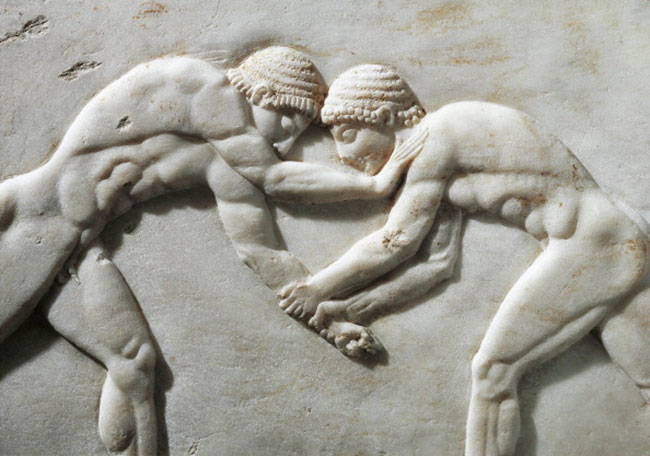
Plinth of
kouros statue,
bas-relief depicting wrestlers,
circa
510 B.C.,
detail
from Kerameikos necropolis
in
Athens, Greece
When there is a lack of a
standard, individuals pursue their desires and interest.
Of course, such
individualism is not necessarily a social evil.
It becomes an issue,
however, when we become so self-absorbed that we become
unwilling to sacrifice for the common good.
Many today feel any
provision for the commons is seen as an intolerable threat to
liberty.
They see themselves as
buckskin-clad plainsmen staring steely-eyed into the horizon free of
all government encumbrances.
In looking at these shortcomings, Plato saw democracies not only as
morally confused with little agreement on values, but so focused on
image that political discourse is superficial.
Plato said,
"democracy is a
charming form of government full of variety and disorder, and
dispensing a sort of equality to equals and unequals alike."
Given these flaws,
it is not at all surprising that democracies are relatively
short-lived forms of government.
Unfortunately, Plato's solution for how best to govern ourselves is
just as unrealistic as democracies.
He proposed a regime
that is ruled by a philosopher-king. This may seem somewhat
self-serving: that a philosopher, Plato, believes that
philosophers should be king.
But this expression could
be a bit misleading...
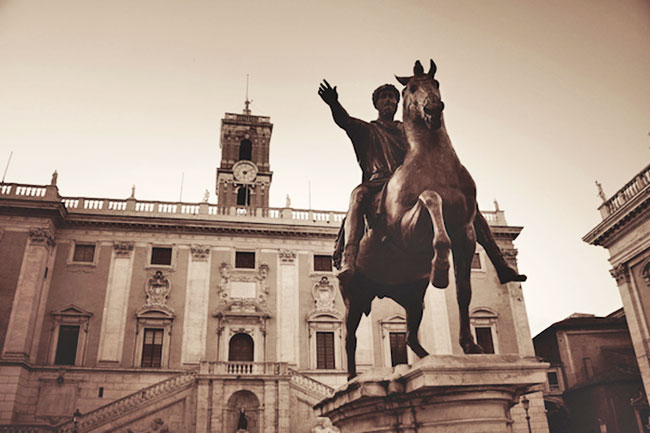
Piazza del Campidoglio (Rome, Italy).
Statue
of Marcus Aurelius,
perhaps
the only person worth the name
of
"philosopher-king."
Plato
described the philosopher-king as,
a man who loved
wisdom more than power...
Such a leader would
understand the good.
His goodness and
moral leadership would pass down to the people providing society
a unified moral standard.
Such a vision is na´ve...
History has shown the
rarity of such leaders; it has proven that such a model is even less
sustainable than democracy.
"I have met the enemy
and he is us" to quote that ancient 'philosopher'
Pogo.
The flaw in democracy is
not the quality of the leaders, but of those that are led.
We, the people, need
to take responsibility to ensure good government.
We all must be
philosophers.
We cannot look to a
man (or woman) on a horse to rescue us.
We, the people, need
to ensure a society that promotes individual self-actualization.
We all must come to
love wisdom, to cherish what is good over what is profitable or
expedient.
Of course, believing that
the masses could, or even would, become lovers of wisdom
might turn out to be just as na´ve a solution as the others...
| 








